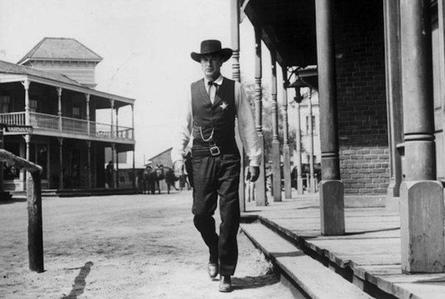B- | A frontier lawman tries to rustle up a posse to fend off an incoming outlaw. Directed by Fred Zinneman Starring Gary Cooper and Grace Kelly Initial Review by Jon Kissel |

Writer Carl Foreman enacts a classic Mary Sue dilemma with Kane, making himself the infallible and upright protagonist of his own script. Foreman was called to testify before Joe McCarthy’s tribunal during the production of High Noon and refused to name names, resulting in his blacklisting and ensuring that his future credits would have to done on the sly under a pseudonym. He funneled that frustration into the film, making an allegory for the perceived cowardice of the industry that failed to rally around him. Miller’s McCarthy equivalent is framed as an inevitable evil, a force that will continue to wreak havoc until some brave man stands up to him. The penalty for this courage may well be death, but going to one’s grave with a clean conscience doesn’t compare to living in fear and shame.
Foreman is Kane in one viewing of the film, but in another, director Fred Zinneman makes High Noon into exactly what it appears to be, a stalwart American icon of toughness and grit standing up to anarchy and lawlessness. The son of parents who died in the Holocaust, Zinneman disagreed with the popular interpretation and reframes the film into an epic Manichean battle where soft civilians must be defended by someone willing to stand up and fight for them, withstanding their doubts and mockery and going it alone if necessary. The story is simple enough that any party can see themselves in Kane’s boots or envision their enemies in Miller’s chaps.
The universality of the plot is a strength of High Noon, something that has surely helped it persist for as long as it has. An icon of 50’s cinema is invoked in the first episode of a 21st century icon, The Sopranos, another work about compromise and weakness, among other things. Strong, silent type Gary Cooper makes Will Kane into a figure worth admiring. If it’s true that disappointment evokes more shame in someone than anger, the person being disappointed must carry a certain dignity for that to be the case. Kane has that amount of dignity, and more. His rejection of the badge at the end of the film should produce a lot of townsfolk bumping into things over the next several days, because it’s hard to imagine them being able to look each other in the eye after such a righteous blow to their pride. Cooper’s able to both be an archetypal Western hero while still being vulnerable, albeit the minimally allowed amount for the time. It’s hard to imagine John Wayne bringing the same amount of doomed pathos to the role.
However, High Noon frustrates with how poorly it judges the intelligence of its audience. At 85 minutes long, Foreman and Zinneman may have felt pressed to explain all the relationships in the large cast, so explain they do. Men describe themselves as Kane’s very good friends to Kane himself. Helen Ramirez’s (Katy Jurado) partners describe themselves as such to her. Fowler tells her new husband that she’s a Quaker and therefore a pacifist, as if that wouldn’t have come up in their previous conversations. It’s all inorganic and bludgeoning, but those aren’t the only time those adjectives could be used. The song that plays over the opening credits is all well and good, as is reusing the melody throughout the film. Having to keep hearing the theme-stating lyrics over and over again is ridiculous. Just play the melody and I’ll be reminded of the lyrics. Certain scenes tip towards Zinneman’s broad-shouldered interpretation, but they do so in comically on-the-nose ways. The judge that sentenced Miller is leaving town, but not before he ostentatiously packs up an American flag and the scales of justice. I like the idea of those and the badge as mere symbols only worth what people are willing to risk for them, but it may as well be accompanied with an alarm and flashing arrow. People in the 50’s could not have been that much smarter or stupider than people of today. Why does High Noon insist that they needed their hands held?
This foundational era of Westerns just might not be for me. I prefer Leone to Ford, and Kurosawa’s equivalent samurai films to both. The Searchers might be in the top ten on Sight and Sound’s definitive List of Lists, but I couldn’t find much of a way in. High Noon’s a solid enough Western with an interesting history and a good lead performance, but the period and its mannerisms keep me at arm’s length. C+
 RSS Feed
RSS Feed